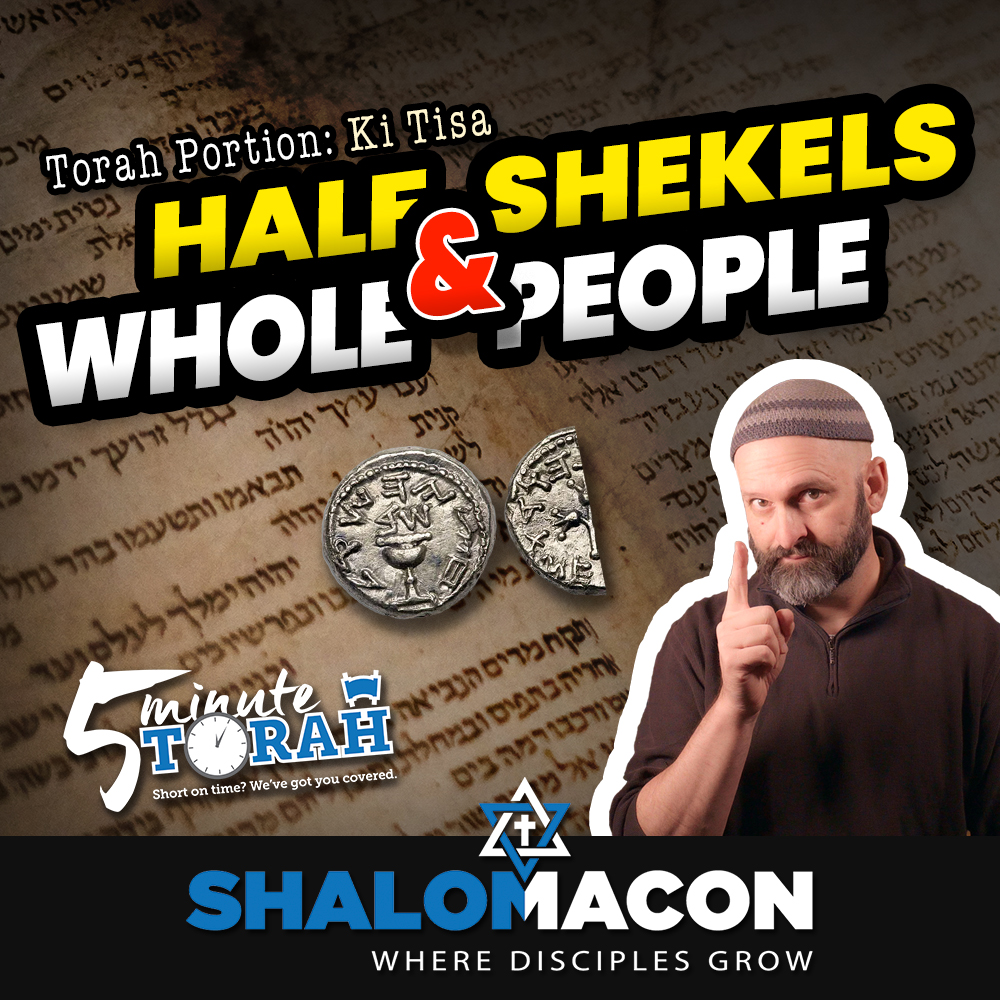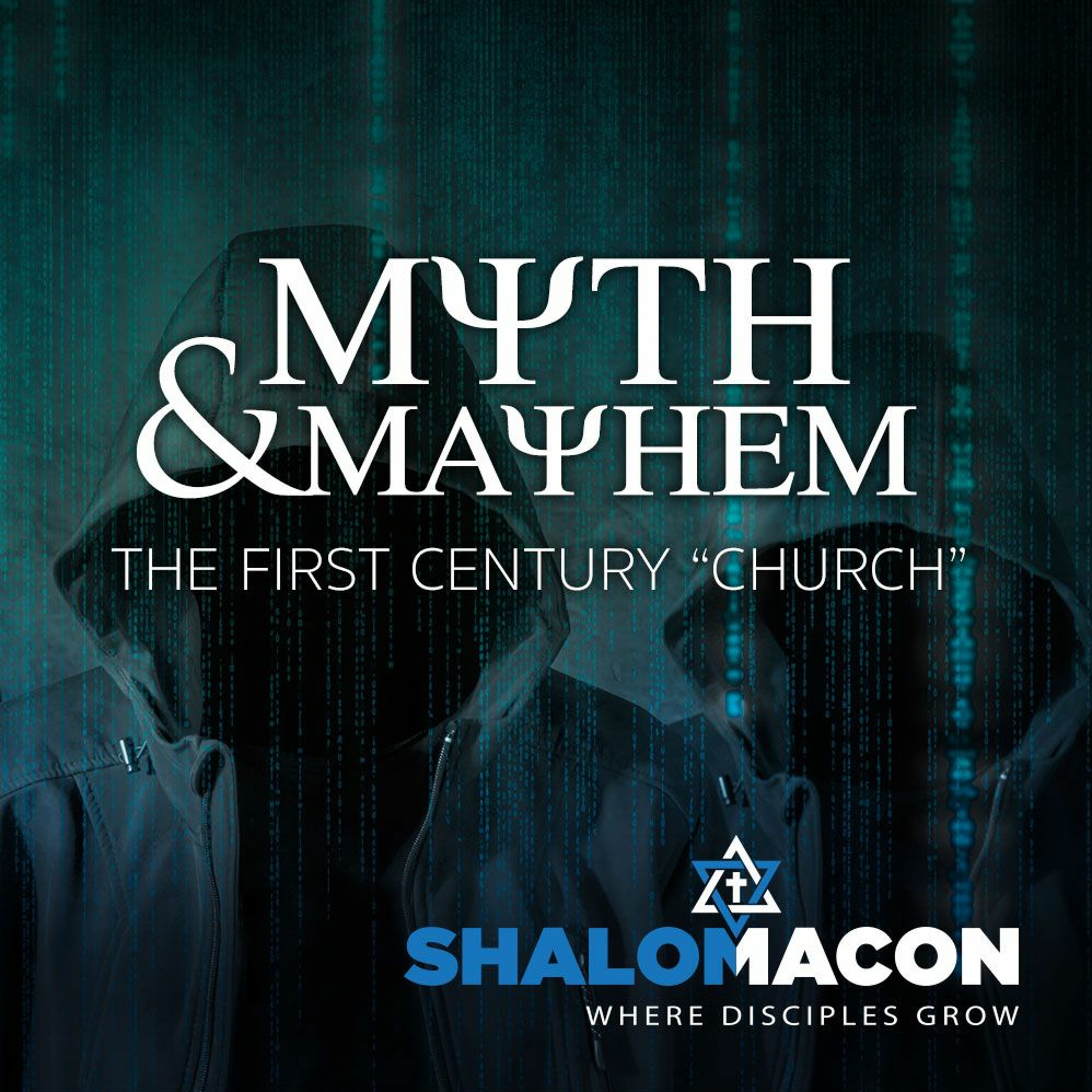Episode Transcript
[00:00:00] A penny. How often do you see a penny in a parking lot? How often do you pick it up? In today's economy, it doesn't seem worth the effort to pick up a penny. What value does it really have? I mean, what can you buy for a single penny? You would have to pick up a hundred of them just to make a full dollar. And not even a dollar goes very far these days. So what's the point? Sometimes we think about this when it comes to people as well. Maybe we think they'll never amount to anything. Why invest my time in them? But is this the way God wants us to treat others? Let's take a look at this idea together in this week's five Minute Torah Shalom and Blessings from Shalom Macon, the place where disciples of Yeshua learn, connect and grow. I'm Darren and before I get into the five minutes of my five minute Torah commentary, let's cover a few quick facts about this week's Torah portion. This week we are studying the portion of Ki Tisa, which is Exodus 30:11 through 34:35 and here are the three things that you need to know about it. Number one Egil Zahav the Golden Calf the bulk of this week's Torah portion is focused on the Egal Zahav, or the Golden Calf, while Moses is at the top of Mount Sinai receiving the covenant on behalf of the children of Israel. At their spiritual zenith, the Israelites plunged to one of their lowest lows. They created a golden idol to take the place of the unseen God who had just delivered them from generations of slavery. They even went so far as to say that the golden idol was actually the God of Israel himself. After they made it, they proclaimed, this is your God, O Israel, who brought you up out of the land of Egypt. This is Exodus 32:4. When Moses saw what the children of Israel had done, he threw the tablets down and shattered them, realizing they weren't worthy of the holiness God wanted to give to them. After that, he commanded the Levites to take their swords and slaughter those leading the Israelites into idolatry. Approximately 3,000 men died that day because of idolatry. The God of Israel doesn't share his affection with other gods. Number two Yom Hashabbat the Sabbath Day up to this point, the children of Israel have been told to keep the Sabbath, but there have been no explicit warnings about the gravity of its sanctity. In our current Torah portion, however, the critical nature of the Sabbath is made crystal clear. God tells the Israelites, above all, you shall keep my Sabbaths for this is a sign between me and you throughout your generations, that I, the Lord, sanctify you. You shall keep the Sabbath because it is holy for you. Everyone who profanes it shall be put to death. Whoever does any work on it, that soul shall be cut off from among his people. Six days shall work be done, but the seventh day is a Sabbath of solemn rest holy to the Lord. Whoever does any work on the Sabbath day shall be put to death. This is Exodus 31:13 15 since the covenant at Sinai, the Sabbath has been the wedding ring that Israel has worn as a sign of her fidelity to the God who redeemed her. A common saying is that it's not so much that Israel has kept the Sabbath, but the Sabbath has kept Israel. A very true saying indeed. And number three Shalosh Esrei Midot the 13 Attributes of Mercy this week's Torah portion also contains God revelation of His 13 attributes of mercy. After destroying the first set of tablets, God tells Moses to cut out new stone tablets so that he can write on them once more. Moses then climbs Mount S. Sinai to receive the Torah anew. In the process of receiving what most people call the law, God reveals to Moses these 13 merciful attributes of his divine character that underscore his compassion and forgiveness that he longs to bestow upon his people. Are you a disciple of Yeshua? There are a lot of people who say they are, but when it comes down to it, they really don't even know what it means to be a disciple. Why? Because discipleship is a concept unique to to Judaism. It's an intimate relationship between a rabbi and his student. Yeshua called 12 men to be in his inner circle of discipleship, and those 12 men changed the world. What did they know about being a disciple that we don't? I wrestled with this question when I wrote my book the Four Responsibilities of a Disciple. There were a ton of books already written on how to make disciples, but I wanted to know what it meant to be a disciple because it seems that all of these disciples that were being made in our day really weren't having an impact on the world around them like they should. I found out that there were four responsibilities every disciple should know and that when implemented, living out these four responsibilities has the potential to change the world. If you want to know what it means to be a true disciple of our master Yeshua, then check out my book the Four Responsibilities of a Disciple, using the link below. This week's Torah commentary is called Half Shekels and whole people and comes from my book Five Minute Torah, Volume 3. Although the Torah portion Ki Tisa covers a wide range of topics and events, the opening paragraph of this portion is our focus for this week's Insight. It is the Lord's command for each of the Israelites who are at least 20 years old to bring a half shekel to the Lord. Each one who is numbered in the census shall give this half a shekel according to the shekel of the sanctuary. The shekel is 20 gerahs have a shekel as an offering to the Lord. Everyone who is numbered in the census from 20 years old and upward shall give the Lord's offering. The rich shall not give more and the poor shall not give less than the half shekel when you give the Lord's offering to make atonement for Your lives Exodus 30, verses 13 through 15 the most common question asked about this passage is why only a half shekel? The most common answer is that only when we work together are we able to create the whole. But I would like to add a slight nuance to this understanding. First, although the Torah tells us that this half shekel was given by the children of Israel in order to make atonement for your lives, the Lord continues by telling Moses, you shall take the atonement money from the people of Israel and shall give it for the service of the Tent of Meeting that it may bring the people of Israel to remembrance before the Lord so as to make atonement for your lives. This is verse 16. We know from this that the money was somehow used for the service of the Tent of Many. But how was this money actually utilized? Jewish sources tell us that the funds collected through this means were used to purchase livestock for communal offerings. How does this fulfill the reason outlined above and bring the people of Israel to remembrance before the Lord so as to make atonement? When we help others to fulfill a mitzvah, a commandment, we are also helping them be visible in the eyes of their Heavenly Father. It happens when we work together. In Ki Tiza, we learn that the Lord designated Bezalel and Oholiav as the primary artisans who would be in charge of making everything that was needed for the Tabernacle from start to finish. He also appointed other craftsmen to assist them because Bezalel and Oholiav were not supposed to do everything themselves. They were supposed to be the lead craftsmen. But what about the common Israelites that were not craftsmen? Did they play a part in the work? Also, back in the Torah portion of Terumah, we learned that every Israelite would have an opportunity to contribute to the creation of the Tabernacle and its furnishings by donating items that would be used for its construction. The Tabernacle wasn't disconnected from the common Israelite. Every individual was personally invested in its success, successful completion, and ultimately its purpose. So how does this relate to us today? The author of Hebrews reminds us that we continue to share a role together with our brothers and sisters in Messiah, saying, do not neglect to do good and to share what you have, for such sacrifices are pleasing to God. This is Hebrews 13:16 Yeshua said, so whatever you wish that others would do to you, do also to them, for this is the Law and the prophets. Matthew 7:12 Even though we should all have a personal faith experience and a personal connection to our Creator, our faith finds its strength in community. Despite the sentiments of Cain, we are our Brother's keeper. What we do with others and for others will determine both of our destinies the half shekel was an amount that everyone was able to contribute. We're told that it was a fixed amount that each person was required to give. The rich could not give more and the poor could not give less. This reminds us that we don't have to do something elaborate to make a difference. Each time we invest into the lives of another person, no matter how seemingly small and insignificant it may be, it is as if we are adding our half shekel to theirs in order to make a whole a whole person, not just a whole shekel. Sometimes half shekels can end up making whole people. Let me say one other thing about how small things add up. Sometimes our tiny actions, even if other people don't see them, can affect those around us. If you'd like to know more about how our actions, no matter how large or small, can have ramifications we never dreamed of, then check out my commentary on the double portion of my tot ma se called the Butterfly Effect. Just click on the link right here to get started.



